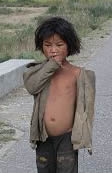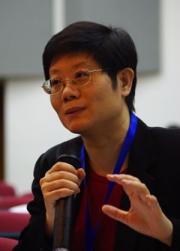School of Social Welfare to help develop plan to deliver social services to China’s needy
School of Social Welfare Receives Three-Year Planning Grant from the Ford Foundation in Support of a Partnership with Beijing Normal University

After three decades of focusing on policy reforms and an unprecedented rate of economic growth, China has turned its attention to the social needs and quality-of-life issues of its citizens. This prioritization shift comes at a crucial time, as the challenges of poverty, unemployment, a growing aging population and lack of adequate access to health care services, to name just a few, continue to impact all facets of the population.
These impending crises also underscore the timeliness of the recent formal partnering between the School of Social Welfare and the School of Social Development and Public Policy at Beijing Normal University. Through the support of a three-year planning grant from the Ford Foundation, the highly anticipated collaboration will work to improve the understanding of China’s social welfare needs, with the long-term goal of promoting an effective social services delivery system nationwide.

“With crises come opportunity,” says School of Social Welfare Professor and project manager of the Berkeley-BNU initiative Julian Chow, PhD. “The opportunities that open up are not only within China’s government and the local community, but also across China and the United States -- specifically in relation to the whole notion of social service, development and professional social work in helping marginalized and vulnerable populations.”
The initial stage of the collaboration will be dedicated to strategizing and determining the specific roles human services programs and social work can most effectively play in China. “I would characterize year one as a mutual learning exchange,” explains Professor Chow. “We will try to identify priority areas on which we can work.”
In addition to Professor Chow, Professors Jim Midgley and Eileen Gambrill will also lend their considerable expertise in the field of international social welfare to the project.

School of Social Development and Public Policy Professor and founding Dean Xiulan Zhang, PhD, who is both a distinguished alumna of the School of Social Welfare and a member of the School’s Advisory Board, will oversee Beijing Normal's efforts in the partnership. “I hope that the collaboration will enhance the social welfare teaching and research capacity in China and also provide opportunities for Berkeley students to come to China to do research and to be interned in agencies,” she says. “This goal is quite ambitious, but this small grant perhaps can help us moving one step forward and to set up direction.”
Shifting from Public to Private
The Chinese government has recognized the need to invest in safety-net services for the country’s most vulnerable populations –for example, increasing funding of social security programs and benefits by nearly 18 percent last year to 293 billion yuan (US$42.8 billion). At the same time, the country has steadily moved towards decentralization of its social welfare system. State offices, including the Ministry of Civil Affairs, have backed policies in favor of non-government supported social services agencies, such as facilities that care for the elderly and collectively-run organizations serving various community needs, particularly in rural areas. Many of these agencies, however, remain unaffordable to the vast majority of people, who are required to pay wholly out-of-pocket for services.
“Since the open-door policy of the economic reforms over the last 30 years, the standard of living has improved, but, as a whole, the economic development has far exceeded the social development,” explains Professor Chow. “As a result, much of the social service systems have not matured– and this has become a concern for the government as well as for the general public.”
Economic Expansion and Lost Sense of Security
In 2010, China ranked as the world’s second largest economy, surpassing Japan, India, Germany and Russia, and finishing only behind the United States. The unprecedented growth in the developing nation shows no sign of slowing down, with the country expected to top the U.S. by as early as 2017.
The implications of this economic shift on the Chinese population are significant. The total number of middle-class households will quadruple over the next decade from the current 57.1 million to 222 million, while the inevitable disparity of wealth will widen between the have and have-nots.
Recent studies indicate that approximately one percent of the country’s population controls 70 percent of the wealth. However, an astonishing 80 percent of the total population falls into the low-income and lower-middle income categories; of this group, nearly 44 percent live in poverty. The increasing gulf between the top and bottom wealth-holders will leave the country’s most vulnerable communities even more dependent on the government or other social service programs for assistance with healthcare, education, food and shelter.
Paradoxically, too, as the nation has gained more widespread economic stability, the more anxious people are becoming about their futures. “There’s a lost sense of security,” observes Professor Chow. “As society develops economically, the vast majority of people feel less secure, particularly the elderly, migrant workers and youth who primarily are not able to access higher education. Despite the improving living standards, they still do not have a national healthcare system, universal health insurance and things such as that.”
But where to start? With so many pressing societal issues among the diverse groups of China’s billions of citizens – intensified by the vastly different needs of the urban and rural populations – how can the Berkeley-BNU initiative begin to approach the complex process of finding and advocating for solutions to the lack of the country’s social services infrastructure?
One way is through a careful consideration of the issues, suggests both Professor Chow and Dean Zhang. “There are many different topics that are of concern. Poverty, for example, and the inequality between those who benefit from the open economic reform and those then who are further left behind,” says Professor Chow.
“We probably will start from aging and long-term care,” adds Dean Zhang. “Child welfare and mental health needs are also need to be addressed.”
Burgeoning Senior Population
At the end of 2009, China’s retirees – individuals over the age of 60 – totaled 167 million, representing about 12.5 percent of the entire population. This group is expected to increase by three percent every year, reaching 450 million by the middle of this century. The population of people over the age of 80 will be 24 million by 2015.
The well-being of the country’s senior citizens is of paramount concern, and not only because of their growing numbers. The centuries-old system of elder care falling to the family has changed dramatically in just the past couple of decades. “The younger generation does not feel as compelled to defer and sacrifice for the sake of the family,” explains Wujing Harrison of Beijing Normal University’s San Francisco office. “They want to enjoy the benefits of the new economy, including personal prosperity.”
“Because of the capacity of social change, the elderly are isolated from their own children,” says Professor Chow.
Further challenging the cultural structure are the effects of the “one-child family” policies implemented in 1979. The aggressive campaign to limit family size and attempt to control overpopulation has put an intense burden on the generation of single children willing to assume the task of caring for their elders. “With the ‘one-child policy,’ there might be two parents, two grandmothers and two grandfathers all dependent on one person to take care of them financially and to be responsible for their healthcare needs,” points out Harrison. “That is a huge weight of responsibility to bear.”
In addition to the limitations of family-based care, facilities with services targeted to the elderly are unable to handle the growing demand. A survey conducted in Harbin, the capital city of the northeastern province of Heilongjiang, found that there were only about 200 registered institutions to serve the region’s 1.2 million elderly, including 120,000 with disabilities.
According to Jie-Ping Huang, a School of Social Welfare visiting scholar from the Beijing Institute of Technology, many senior centers are trying to accommodate twice as many people as their capacity, while staff receive insufficient or no formal training on how to care properly for clients. “I took several of my students to observe these facilities in Beijing, and not one of them said they would place their parents in the centers,” she says.
Caring for "Leftover" Children
China’s decentralization of its social services system extends to child welfare practices. Once the major service provider for the care of abandoned and orphaned children, the Chinese central state has relegated the responsibility to local-level governments as well as to Western non-governmental agencies (NGOs).
The number of children who are not in direct custody of a parent or other family member is estimated at 712,000 across the country -- a figure that has increased by close to 25 percent in the last five years. This vulnerable population includes a group known as “leftover” or “unattended” children – youth who have been left behind in their native rural communities as their parents seek out work opportunities in the urban centers. While not technically orphaned, these children tend to exhibit more emotional and behavioral problems. In cases where the children accompany their parents to the cities, they are unable to access most healthcare and educational benefits due to China’s regulations limiting school and medical services to established residents. As a result, children under the age of 16 in these migrant families remain unregistered and uncounted.
“The ‘residential identification’ program will always mean an unfair divide between children born in urban areas and those born in rural areas,” says Huang. “Schools and other facilities outside of cities are very much inferior.”
Seeking Systems and Solutions
Despite the structural and societal challenges in improving the quality of life for China’s vast citizens -- compounded by the lack of a stable national human services network to assist the most vulnerable individuals and families -- the notable bright side is that the country’s economic growth enables the central government to invest significantly in developing an infrastructure for the needed safety-net programs.
Last year, the state indicated that it would allocate an additional 850 billion yuan (US$123 billion) over a three-year period to improving public and social services, including healthcare in rural areas as well as salary increases for elementary and secondary school teachers.
The central government is also providing continuous funding to the construction of facilities serving the elderly, particularly those no longer able to work or whose guardians are unable to support them. Additionally, training programs to improve the level of care provided in these facilities, as well as a formalized campaign to encourage social work students and current social work professionals to take positions in the newly established institutions, have been widely initiated.
Regional government agencies throughout the country, moreover, are providing a small “allowance,” or social security benefits, to individuals over the age of 80. In the province of Yunnan, nearly 600,000 seniors have received support since the program launched in January 2009.
As the focus of the Chinese government has turned to developing social services, the Berkeley-BNU collaborative is positioned to contribute to the knowledge base of the country’s needs and services – both through informing policy based on research, data and practice and helping prepare future generations of social workers for the profession.
“At the School of Social Welfare, we have areas of specialized knowledge, particularly in working with the public sector,” says Professor Chow. “What we can contribute to China through the collaborative is direction in developing a social service infrastructure. Many of our faculty have expertise from working within public services, looking at policy and services issues and collaborations across service domains and different social systems.”
“I think the areas of collaboration include helping China to design social service and social welfare program curriculum,” echoes Dean Zhang, who notes that BNU is simultaneously launching a large project to train social welfare professionals. “The curriculum is very much needed.”
“This collaboration is really about trying to look at the cultural, societal, economic and political systems in China and see the role of social service and social work,” Professor Chow explains. “It will be exciting to partner with Beijing Normal to develop a system that will meet the context of China’s needs."
For More Information:
Click here to read more about Professor Chow's work.
Click here to read about Professor Xhang’s profile.
